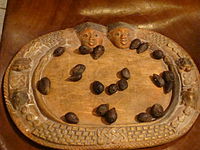- Oyotunji
-
Oyotunji African Village is a village located near Sheldon, Beaufort County, South Carolina that was founded by the late Oba Efuntola Oseijeman Adelabu Adefunmi I in 1970, as part of a "New World Yoruba" initiative.
Oyotunji Village covers 27 miles. During the 1970s, the era of greatest population growth at the village, the number of inhabitants grew from 5 to between 200 and 250. (Goldstein, Hunt, and McCray) The population is rumored to fluctuate between 5 and 9 families as of the last 10 years. It is promoted as an authentic Yoruba village and as a successful example of Pan-Africanism in the New World, and receives tourists from time to time, many of whom are African-American. It was originally intended to be located in Savannah, Georgia, but was eventually settled into its current position after disputes with neighbors in Sheldon proper over drumming and tourists.
Historically, residents of Oyotunji Village joined twentieth-century black nationalist ideology with aspects of Yoruba and Fon cultures to form an innovative community. It can be asserted that Oyotunji villagers consciously excised “European” characteristics from certain Cuban and Haitian traditions. In turn, they intertwined elements of the Yoruba and Fon cultures upon which these traditions were based with black nationalist ideology. In this way, the villagers helped to develop a unique brand of Orisa (or deity) worship, rich with black nationalist concepts. The villagers also made an effort to build an independent nation based on West African cultural values. (McCray, 1-3)
References
- Capone, Stefania. Les Yoruba du Nouveau Monde: religion, ethnicité et nationalisme noir aux Etats-Unis. Karthala, 2005.
- Clarke, Kamari. Mapping Yorùbá Networks. Power and Agency in the Making of Transnational Communities. Duke University Press, 2004
- Davis, Rod. American Voudou: Journey into a Hidden World. Denton: University of North Texas, 1998.
- Goldstein, Joshua. “A King in South Carolina.” The New Republic, 27 May 1978, 18.
- Hunt, C.M. (1977), 'Oyotunji Village: Yoruba Movement in America.', PhD Dissertation, West Virginia University.
- Hunt, Carl M. Oyotunji African Village: The Yoruba Movement in America. Washington, D.C.: University Press of America, 1979.
- LeFever, Harry G. “Leaving the United States: The Black Nationalist Themes of Orisha-Vodu.” Journal of Black Studies 31, no. 2 (2000): 175-195.
- McCray, Kenja. "Black Gods, Black Power: Life at Oyotunji Village, 1970-1990." M.A. Thesis, Clark Atlanta University, 2002.
- Yemi D. Ogunyemi (Yemi D. Prince)Oyotunji African Kingdom: "Literatures of the African Diaspora,"2004.
External links
- Official Oyotunji Village Website
- Ile Ifa Jalumi - Oyotunji Outpost
- Oyotunji Village and Adefunmi Tribute: Biography, Bibliography, Photos and Interviews, Roots and Rooted
- RoadsideAmerica.com article
Deities Supreme BeingCountries Topics Sacred sites Legendary figures Categories:- Populated places in Beaufort County, South Carolina
- Intentional communities
- Religious organizations established in 1970
Wikimedia Foundation. 2010.

